139 Staggering Singles’ Day facts every retailer should know in 2024

There’s no denying it: Singles’ Day is on the rise. Every year brings more companies, more countries, and billions more into its fold. What started as an “Anti-Valentine’s Day” and a celebration of singledom has transformed into the biggest ecommerce shopping day of the year. Here’s what you need to know about the day known as Double Eleven: its origins, its present-day stats, and the trends shaping its future.
Table of contents
- What is Singles' Day?
- When is Singles' Day?
- Who created Singles' Day?
- Singles' Day grows 10,000x in 14 years
- Singles' Day sales statistics
- Singles' Day shopping statistics
- Single's Day statistics by ecommerce platform
- Singles' Day technology & trends
- Singles' Day global statistics
- Singles' Day website issues
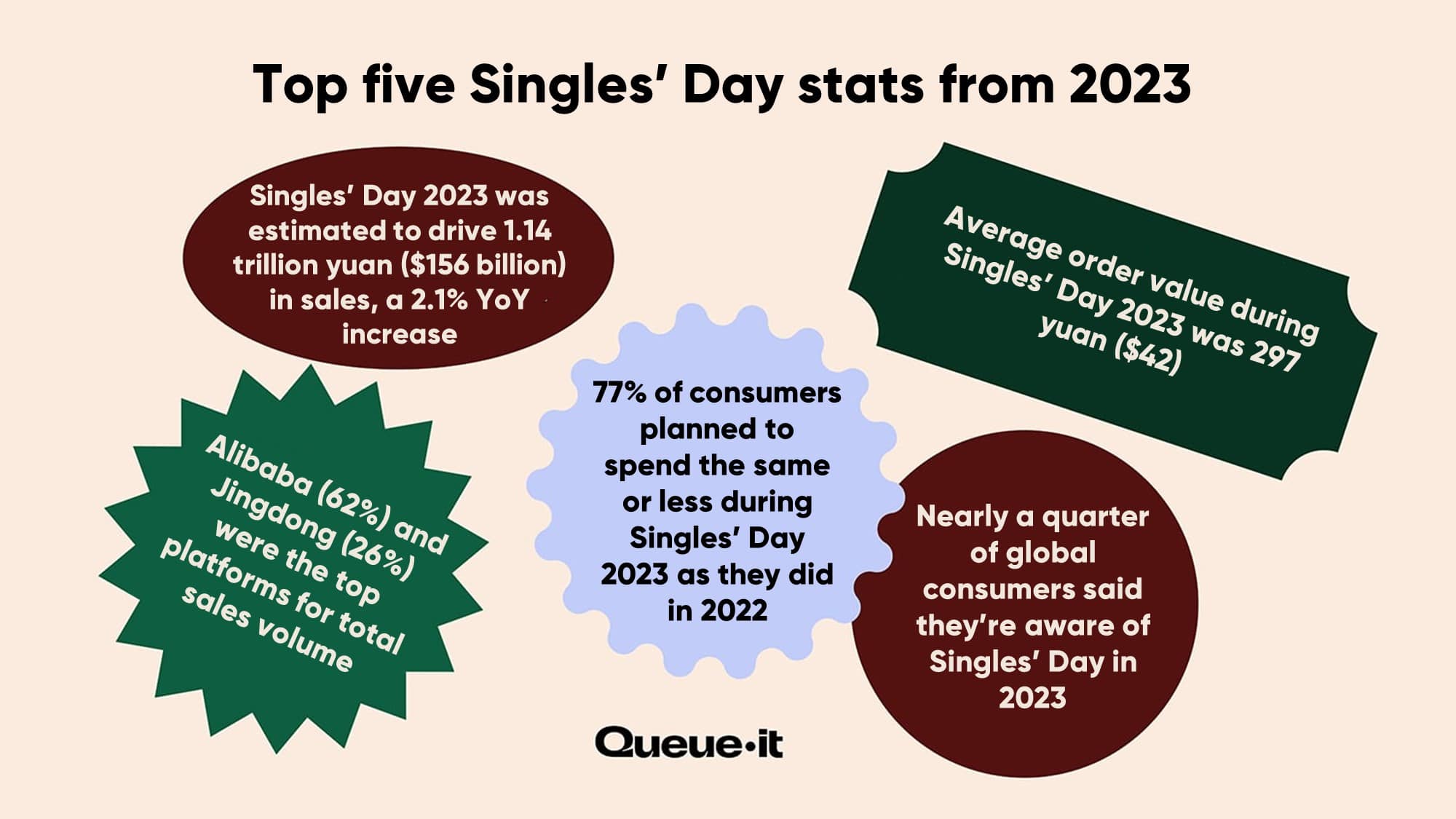
Singles’ Day is the world’s biggest shopping event, with sales estimated at $156.4 billion USD (1.14 trillion yuan) in 2023.
For a sense of scale, ecommerce giant Alibaba’s gross merchandise volume (GMV) during Singles’ Day 2023 was approx. $84.5 billion USD. That’s over 6 times the global GMV from Amazon’s Prime Day and almost 10x what U.S. consumers spent online across all retailers during Black Friday 2023.
Dubbed “Anti-Valentine’s Day”, Singles’ Day is a celebration of single people across China, and increasingly, the world.
RELATED: 127 Black Friday Statistics Every Retailer Needs to Know in 2024
Singles’ Day falls every year on November 11. It’s known as 11.11, Double Eleven, or “bare sticks holiday” because of how it looks numerically, consisting of four lonely ones.
But Singles’ Day has expanded in recent years, with presales now starting in late October, and promotions running through to Nov. 11.
Singles’ Day was created in 1993 by students from Nanjing University who wanted to claim their own Valentine’s Day for singles. From there, the celebrations quickly spread beyond the university, becoming widely recognized across China.
Alibaba, China's largest retailer and ecommerce company, embraced Singles’ Day in 2009. The company saw it as a chance to boost sales between China’s Golden Week national holiday (the first week of October) and Christmas.
China’s Singles’ Day sales, now officially called the 11.11 Global Shopping Festival, has skyrocketed in popularity over the last decade.
In 2009, Alibaba’s first Singles’ day sales event included 27 brands, generating a gross merchandise volume (GMV) of $7.8 million USD or 50 million yuan.
By contrast, Alibaba’s 2021 Singles’ Day GMV hit an all-time high of $84.54 billion USD. That’s up over one million percent (1,083,746%), or 10,000x in just 12 years, with an 8% increase from 2020.
2023 was the second year in a row Alibaba declined to release its sales data, with the company simply stating sales were “in line” with those of 2022.
Alibaba rival JD.com (China’s second-largest retailer) also declined to release sales numbers for the first time—although they called their sales “record-setting”.
Estimates put Alibaba’s Singles’ Day sales growth in 2023 at around 2% YoY.
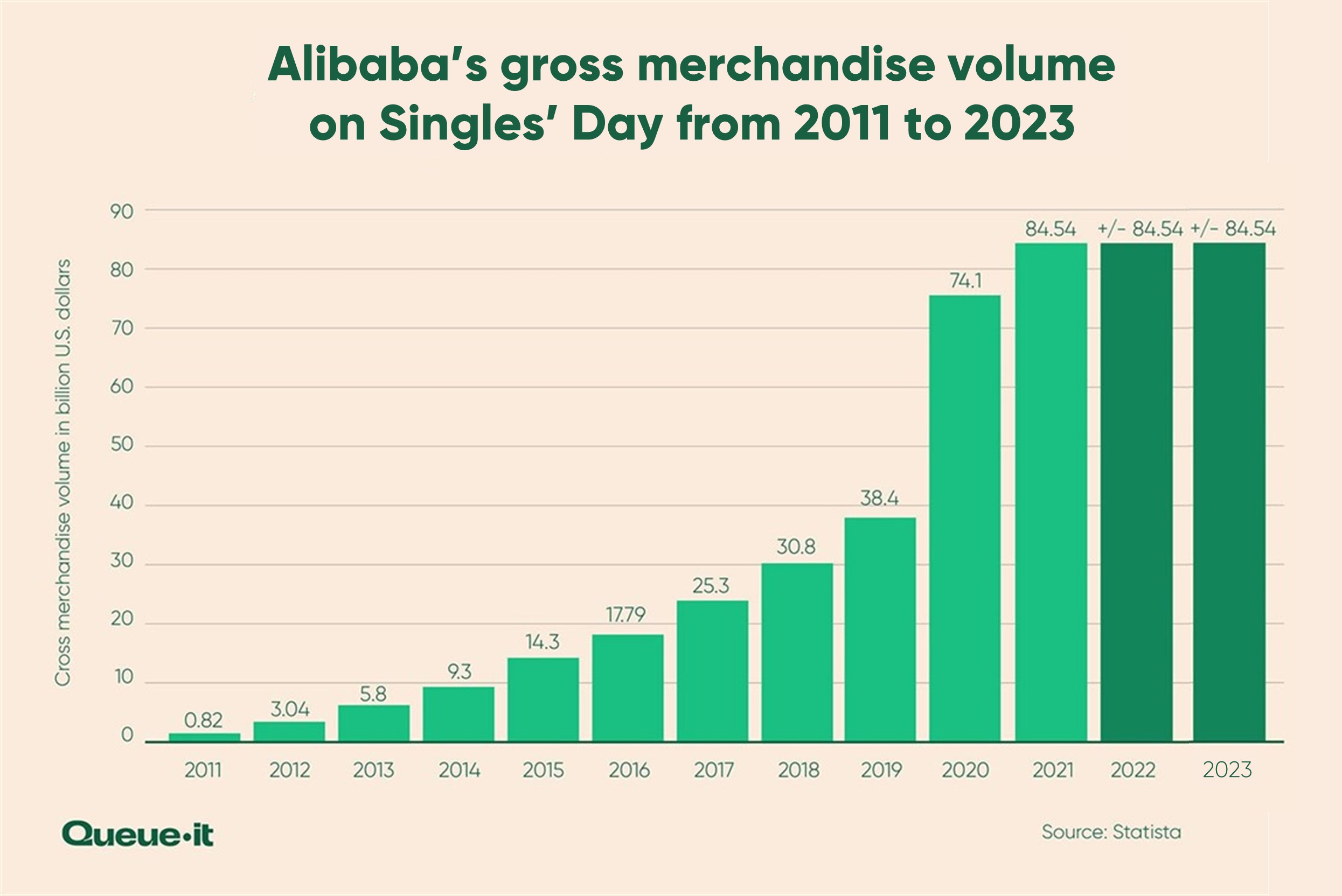
This pales in comparison to the 86% growth Alibaba experienced between 2019 and 2020, but remains an impressive result in a year marred by economic uncertainty and anti-monopoly action by the Chinese government.
Singles’ Day 2023 attracted over 1 billion total visitors across platforms, over 532 million of which shopped with Alibaba. There were over 100 million products on offer (including over 35 million new products), over 300,000 participating brands, over 60 million hours spent watching Singles' Day livestreams, and dozens of new AI-powered ecommerce innovations and experiences.
China’s big retailers declined to release their Singles’ Day revenue in 2023, so we have to rely on estimates:
- Data provider Syntun estimated total GMV across major ecommerce platforms increased 2.1% to 1.14 trillion yuan ($156.4 billion) in 2023.
- Consultancy Bain’s estimate was similar, claiming Singles’ Day sales hit 1.15 trillion yuan in 2023.
- Alix Partners predicted an increase of 18% for total spend during 2023's Singles' Day sales.
Singles’ Day 2023 sales volume across all platforms is estimated at $156 billion, making it the biggest global online shopping day ever.
- The total sales volume of traditional ecommerce platforms was 923.5 billion yuan.
- Livestreaming ecommerce platforms had a total sales volume of 215.5 billion yuan.
- New retail platforms had a total GMV of 23.6 billion yuan during Singles’ Day 2023.
- Community buying platforms had a total GMV of 12.4 billion yuan.
- Online transactions in greater China grew 9% YoY during Singles’ Day 2023.
- Online transactions in greater China grew 237% during Singles’ Day sales compared to the same period in October.
- In 2023, Chinese consumers spent an average of 297 yuan per order during Singles’ Day sales.
- The top five provinces in terms of Singles’ Day sales volume in 2023 were Guangdong, Zhejiang, Jiangsu, Shanghai, and Beijing, respectively.
- The top cities were Shanghai, Beijing, and Hangzhou.
- In 2024, Alibaba, JD.com, and Pinduoduo all launched their Singles’ Day sales periods on Monday October 14th, a full week earlier than in previous years.
- 77% of consumers planned to spend the same amount or less during Singles’ Day 2023.
- 53% of shoppers said they were excited for Singles' Day 2023, compared with 76% back in 2021.
- 45% of consumers said they’d shop during Singles’ Day to get good value, making it the top reason to shop on the day.
- Of this group, 35% said they were waiting for better promotions to make their money go further, 18% said they were eyeing bulk deals, and 48% said they were shopping with cheaper brands or switching to generic-label products.
- China’s State Post Bureau said express delivery hit record highs during Singles’ Day 2023, with 5.26 billion packages delivered between Nov 1 and Nov 11, a 23% increase YoY.
- On 11.11, 639 million parcels were delivered across China, up 16% YoY.
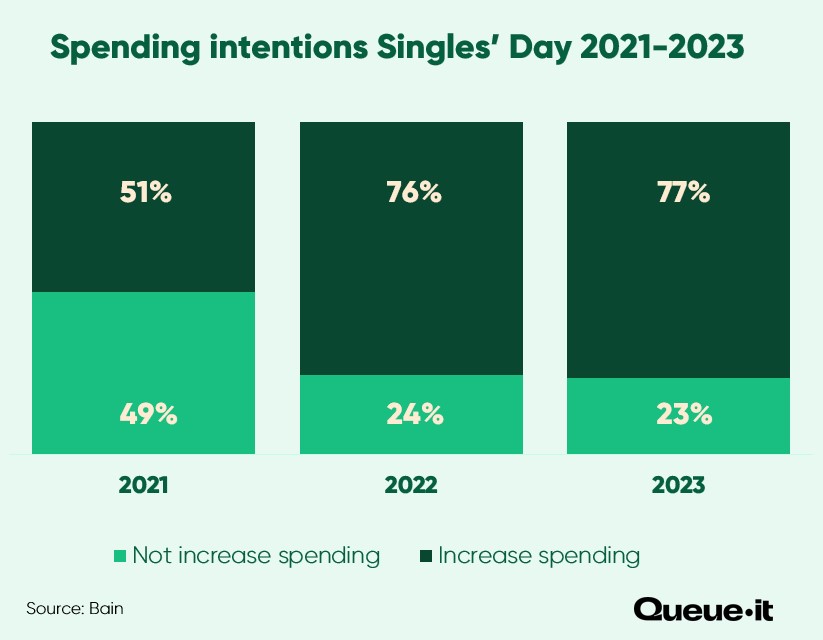
- Electronics and home appliances attracted the most sales, with 152.6 billion yuan worth of product sold and Haier as the top brand.
- Skincare reached 58.2 billion yuan, with L’Oreal as the top brand.
- Personal Hygiene Products & Household Cleaning amassed 29.3 billion yuan in sales, with Kerastase as the top brand.
- Cooking Ingredients saw sales of 22.7 billion yuan, with Jinlongyu as the top brand.
- Fragrance & Makeup amounted to 20.4 billion yuan, with YSL as the top brand.
- Health & Supplements garnered 14.8 billion yuan, with Swisse as the top brand.
- Snacks totaled 12.2 billion yuan, with Three Squirrels as the top brand.
- Pet Foods reached 4.8 billion yuan, with ROSY FRESH as the top brand.
- 44% of consumers said they’d increase their spend on clothing, fashion and accessories during 2023’s Singles’ Day sales, making it the top growth category.
- 42% of consumers said they’d increase their spend on beauty and personal care products and general groceries, making these two categories tied for second place.
- Lifestyle and home furnishing came in at number three, with 40% of consumers planning to increase their spend in this category.
- The top categories where consumers planned to decrease or cut spending altogether were wine and spirits, luxury goods and jewelry, and health and fitness gadgets.
- 48% of respondents said they were likely to spend more during Singles’ Day 2023 than in 2022.
- Over 60% of consumers said they’ll spend at least 3,000 yuan during Singles’ Day sales in 2023, up 11% YoY.
- 83% of consumers consider “brand authenticity” as the key criteria for choosing products, followed by “product functionality” at 82%.
- Only 46% of consumers considered “livestreaming” a promotional tactic that influenced their purchase decision.
- Consumers sought products and deals across multiple channels in 2023, with the average number of channels at five, a 20% lift YoY.
- Tmall (92%) and Jingdong (75%) remained the leading ecommerce platforms where consumers planned to shop during Singles’ Day 2023.
- 66% of consumers said they plan to increase their spending on Chinese brands, while products from all other countries and regions saw a net decrease in purchase intent.
- 73% of shoppers said they are heavily influenced by family and friend recommendations for their Singles’ Day purchase decisions.
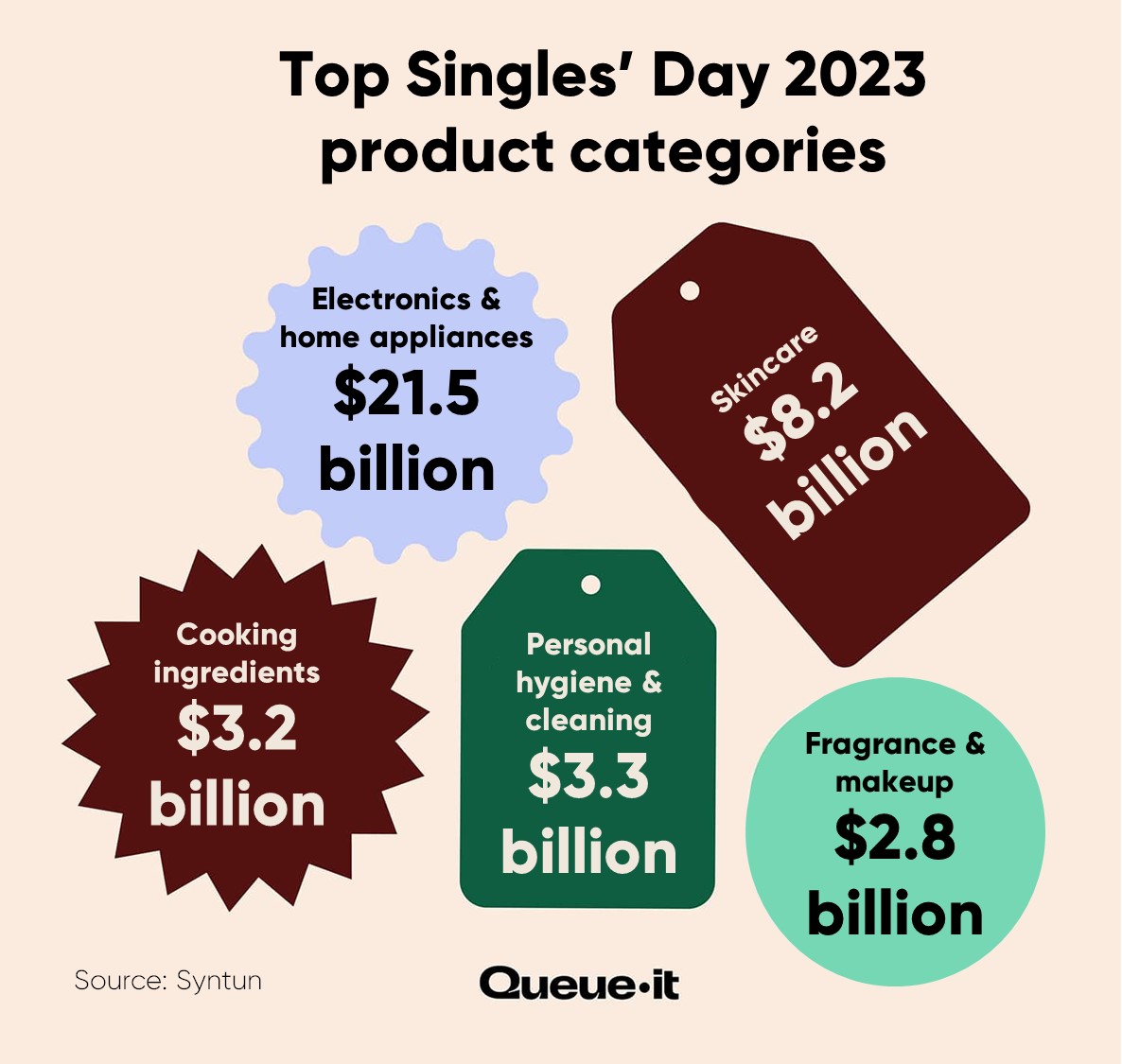
- Alibaba/Tmall remained the top shopping destination during Singles’ Day 2023, with 62% of all sales.
- JD.com was the second most popular place to shop, with 26% of total sales.
- Pinduoduo was number three with 7% of total sales.
- 92% of consumers planned to purchase from Tmall/Taobao during 2023’s Singles' Day sales, up from 87% in 2022 and down from 94% in 2021.
- 75% of consumers planned to purchase from JD.com in 2023, up from 62% in 2022 and 67% in 2021.
- Douyin saw the biggest lift, with 55% of consumers planning to purchase from there in 2023, up from 38% in 2022 and 26% in 2021.
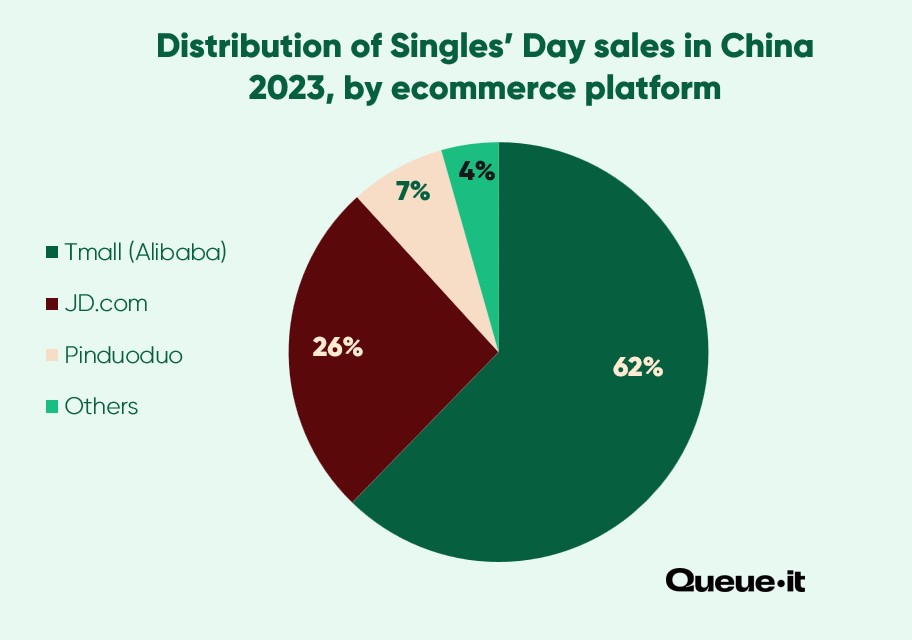
- On 11.11 2023, 532 million people shopped on Alibaba’s C2C ecommerce platform Taobao.
- At Alibaba (or Tmall), 402 brands reached over $13.7 million in sales during Singles’ Day 2023, including Proya, L’Oréal, Guerlain, Fila and Nike.
- Alibaba had over 80 million products on offer during 11.11 2023.
- Investment in short-form video for Singles’ Day 2023 grew by 300% 2022.
- Transactions for 38,000 brands grew by over 100% year on year.
- Taobao and Tmall’s direct discount venue offering a 15% price reduction recorded 210 million orders, while the venue featuring value-for-money products generated nearly 90 million orders.
- Tmall’s event attracted over 800 million cumulative visitors.
- Lower-tier cities helped drive growth, adding over 20 million new buyers and 140 million additional orders.
- 38 livestreaming channels on Taobao and Tmall generated over 100 million yuan in GMV each.
- 451 livestreaming channels generated over 10 million yuan in GMV.
- Taobao and Tmall merchants added more than 100 million new members in total during Singles’ Day 2023.
- Singles’ Day 2023 on Tmall saw a 150% YoY increase in weekly active businesses.
- Daily brand advertisements on Tmall grew by double digits YoY.
- Just one hour after sales started on October 31, 155 brands had sales exceeding $13.7 million (100 million RMB).
- Sales turnover of 79,100 brands including Gucci, Burberry, Asus, and Erdos in the first hour exceeded that of whole Double 11 day last year.
- In 2024, 300,000 brands will participate in Singles’ Day on Alibaba’s Tmall platform.
- Tmall’s 2024 Singles’ Day sales will feature over 35 million new products, including over 500 exclusive collaborations.
- As of September 2024, Alibaba’s 88VIP membership program has over 42 million paying members. These members will receive exclusive benefits during Singles’ Day 2024, including interest-free installment plans, premium return services, and high-value coupons worth some RMB20 billion, a significant increase from the previous year.
- Alibaba expects about one billion consumers to participate in Singles’ Day sales in 2024.
- In 2024, Alibaba plans to give out 30 billion yuan in consumer vouchers.
- Alibaba also plans to dedicate resources worth up to 10 billion yuan to boosting traffic.
RELATED: How aCommerce & L’Oréal Deliver a Fairer Shopping Experience

L'Oréal's Singles' Day livestreams on Alibaba's Taobao
- Over 60 brands on JD.com achieved sales exceeding $137 million (1 billion yuan) during Singles’ Day 2023, including Xiaomi, Haier, Midea, Hisense, and Gree.
- Over 30 brands hit the 1-billion-yuan mark in the first week of sales.
- During the first week of JD.com’s Singles’ Day promotions, the transaction volume of 15,000 brands increased fivefold YoY, with nearly 9,000 brands experiencing over tenfold growth in transaction volume.
- The transaction volume for over 20,000 brands on JD.com during Singles’ Day increased more than 3x YoY in 2023.
- Luxury brands Dior, Tiffany and Co., and Bottega Veneta’s turnover increased by more than four times YoY.
- JD.com’s “JD Procurement and Sales Manager Livestreaming” initiative attracted over 380 million visitors during Singles’ Day 2023.
- New merchants on JD.com experienced a fivefold increase in order volume compared to the same period in the preceding month.
- JD.com’s “10-billion-yuan Discount Day” on Oct 31 generated over 100 million yuan in transactions in the first four minutes.
- Their “9.9 yuan Items with Free Shipping” day on Nov 2 saw a massive 35-fold increase in order volumes and a 28-fold increase in user engagement compared to their 618 Grand Promotion earlier in the year.
- Major mobile phone brands like iPhone, Xiaomi, Honor, Huawei, OPPO, and vivo experienced a 100% YoY increase in order volume in the first 10 minutes of the sales on the 31st of October.
- Luxury brands like Louis Vuitton, GUCCI, and DIOR also saw their transaction volumes more than triple within the first 30 minutes compared to the previous year.
- JD’s on-demand brick-and-mortar store network almost doubled in 2023, with over 400,000 participating stores offering one-hour delivery.
- Consumers in over 2,200 counties and districts saw products delivered to their doors within minutes.
- 95% of JD’s retail orders were delivered within 24 hours in 2023, with over 10 million products available for same-day delivery.
- JD Cloud, JD’s cloud computing arm, saw peak user visits per second increase by 170% compared with the same period last year.
- JD’s AI-powered intelligent customer service assistant handled over 1.4 billion inquiries.
- The transaction volume of Apple products on JD.com during Singles’ Day 2023 surpassed 10 billion yuan.
- Transaction volume of folding screen mobile phones increased more than 300% YoY.
- AR glasses’ transaction volume increased fourfold YoY.
- Trade-in services for electronics increased fourfold YoY, with transaction volume of extended warranties and screen breakage insurance increasing 100% YoY.
- Over 2,000 home appliance brands’ transaction volume increased 100% YoY.
- Transaction volume of down jackets increased by over 100% YoY.
- Gold and watches saw transaction volume increase 130% YoY.
- Transaction volume of Lululemon products increased 260% YoY.
- Over 350 cross-border imported product categories from JD Worldwide saw transaction volume increase by 100% YoY.
- JD’s omnichannel retail brand in Europe, ochama, saw order volume increase 362% YoY.
- JD.com’s 2024 Singles’ Day sales will feature over 1 billion newly released products.
- In 2024, JD NOW (the on-demand delivery service) has partnered with over 600,000 physical stores across China to provide deliver in as little as nine minutes.

Staff at JD Pharmacy fulfilling Singles' Day orders
Douyin is the Chinese (and original) version of the short-form video app TikTok. The app only released ecommerce functionality in 2020, but it’s become the fastest growing location to shop Singles’ Day ecommerce sales.
- Douyin held the top spot for ecommerce live streaming.
- The cumulative livestreaming hours on Douyin during Singles’ Day 2023 reached 58.3 million hours, up from 38.2 million hours in 2022.
- The GMV of Douyin Mall increased by 119% YoY in 2023.
- The number of merchants on Douyin Mall increased by 91% YoY in 2023.
- Douyin Mall consumers grew by 111% YoY during Singles’ Day 2023.
- Color palettes trended on Douyin in 2023, driving huge sales. The “Maillard” color palette—describing brown and purple shades—was particularly popular, with sales of headbands of this color growing 6,133% YoY.
- Beauty and lifestyle creators also drove big sales in the categories of fake eyelashes (+162% in sales), dental floss (+155% in sales), and height-increasing insoles (+71% in sales).

At any given time, there are hundreds of livestreams running across the Singles' Day shopping period
Livestreamed shopping, also known as live commerce, has been one of the most successful sales delivery methods in China since Alibaba pioneered the trend in 2016.
Live commerce is a Singles’ Day sales staple. It combines ecommerce with entertainment through major celebrities, live giveaways, exclusive discounts, and 24-hour streaming across the whole Singles’ Day sales period.
Here are the stats:
- Four times more livestream broadcast rooms opened in the first 10 minutes of Singles’ Day 2023 than in 2022.
- The jump is largely attributed to the rise of AI livestreamers or “virtual idols” who are estimated to boost average GMV by over 30% by maximizing growth during off-peak periods and having the virtual livestreamer active 24/7.
- During Singles’ Day 2023, JD.com’s virtual influencers were active in over 4,000 live broadcast rooms.
- Major brands like Estee Lauder and L’Oreal used virtual anchors for ecommerce sales during Singles’ Day 2023.
- Taobao (Alibaba’s livestream platform) recorded 684% YoY growth in pre-sale volumes generated by new livestreaming hosts in the first four hours of pre-sales.
- $11.8 billion USD (73.8 billion yuan) was spent on live commerce platforms during 2021 Singles’ Day sales.
- Li Jiaqi, dubbed the “Lipstick King” is rumored to have driven almost sales of over $3.4 billion in 2023.
- 11% of Chinese consumers planned to participate in Singles’ Day just to watch the livestreams in 2021.
- 88% of respondents from first-tier cities planned on spending via livestream shopping during Singles’ Day sales in 2021. For comparison, 79% of respondents from tier-3 and tier-4 cities planned to use livestreamed shopping.
- One 2022 survey found 77% of Chinese shoppers have purchased products using live commerce. For comparison, just 22% of Australian shoppers have used live commerce.
- Users of live commerce spent an average of 9 minutes per day on Taobao across Singles’ Day sales in 2021, compared to 28.3 minutes for non-users.
- Benedict Cumberbatch participated in 2021’s Singles’ Day livestreams to give clues about a mystery box. He joins Singles’ Day Western celebrity livestream alumni Katy Perry, Kim Kardashian, Miranda Kerr, and Taylor Swift.
- Alibaba released it’s AI-powered customer service chatbot Xiaomi ahead of Singles’ Day 2023, providing more personalized and accurate answers to customer inquiries than traditional chatbots.
- Alibaba’s Taobao also debuted a virtual try-on feature, allowing customers to visualize how clothing products would look in real life, including how clothes would stretch, cling, and fold on their bodies.
- Taobao’s virtual try-on feature is available for clothes from over 3,500 merchants on Taobao and has been used by over 500,000 users.

Taobao’s virtual try-on feature is available for clothes from over 3,500 merchants on Taobao and has been used by over 500,000 users.
- Brands and retailers also used another AI-based tool called Energy Expert during 11.11 to cut their carbon footprint and certify their carbon-reduction efforts to help consumers make more informed choices.
- For example, U.S. sports brand Brooks Sports reduced the carbon emissions of its running shoe collection Ghost 15 by 1 kg per pair by using recycled materials, and this process was certified by Energy Expert.
- Swedish food company Oatly also tapped Energy Expert during Singles’ Day to certify the low carbon footprint of its raincoat.
- In 2024, Alibaba launched Marco MT, an AI-powered translation tool supporting 15 languages, to help brands translate their ecommerce content automatically.
- Virtual influencer Ayayi has over one million social media followers.
- Ayayi has partnered with over 30 high-end brands, including Louis Vuitton, Burberry, Porsche, and Prada, for marketing campaigns in China.

- Ayayis’ male counterpart Noah was created based on the votes of over 21,000 Chinese consumers, who chose his personality, skills, and appearance. This resulted, Alibaba says “in a cool male model with dark hair who can dance like a K-pop star”.
- Noah ran a livestream for Tommy Hilfiger, in 2022 where he spent over an hour chatting to customers and dancing. The livestream was viewed by 670,000 people and the brand's GMV from livestreams during the hour quadrupled.

The Southeast Asian and Chinese markets have been ripe for a shopping celebration like Singles’ Day for several reasons. The population is growing, the middle class is emerging with an increasing disposable income, and affordable smart phones are accessible throughout the region.
- Online retail transactions spiked 140% on Singles’ Day 2023 compared to the first week of October in Southeast Asia.
- In Thailand, sales increased 182% month-over-month (MoM) during Singles’ Day sales 2023.
- In Singapore, sales increased 176% MoM during Singles’ Day sales 2023.
- In Malaysia, sales increased 156% MoM during Singles' Day sales 2023.
- In Indonesia, sales increased 131% MoM during Singles’ Day sales 2023.
- In Vietnam, sales increased 129% MoM during Singles' Day sales 2023.
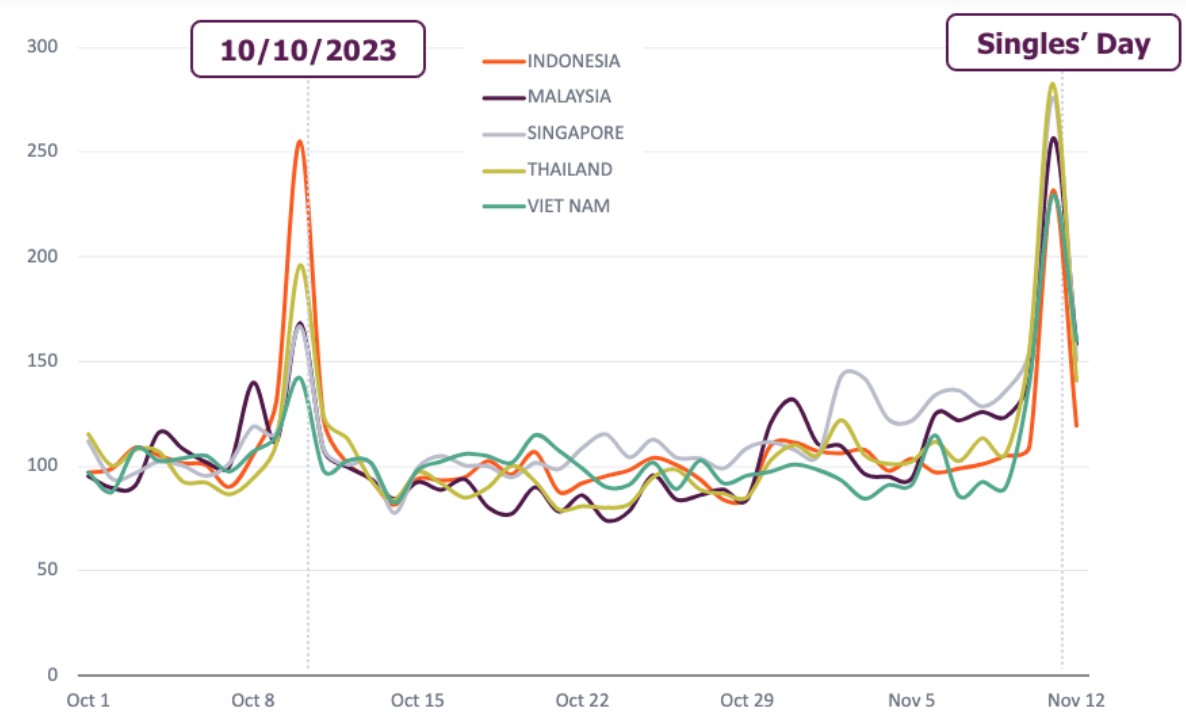
Indexed transactions from Southeast Asian 2023 (Source: Criteo)
Is there potential for Singles’ Day shopping celebrations to be incorporated into Holiday Season sales outside Asia?
Many signs point to yes.
More and more European ecommerce companies are merging Singles’ Day into their end of the year sales, both in China and in their home markets.
- Awareness of Singles’ Day in the U.S. reached 17% in 2023.
- Awareness of Singles’ Day in the U.K. reached 19% in 2023.
- In Poland, awareness of Singles’ Day reached 56% in 2023.
- In Germany, awareness of Singles’ Day reached 41% in 2023.
- In Australia, 20% of respondents were aware of Singles’ Day in 2023.
- In 2023, nearly a quarter of respondents across the globe said they’re at least somewhat aware of what Singles’ Day.
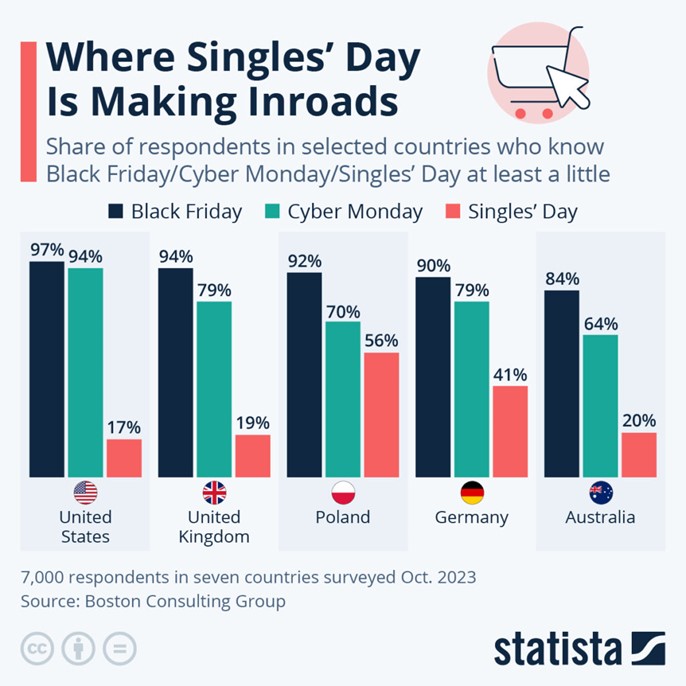
- The German-based Media Markt, one of Europe’s largest consumer electronics retailers now promotes Singles’ Day at their stores. They ensure their discounts are “nicht nur für Singles” (not just for Singles).
- The biggest Dutch ecommerce site, bol.com, began participating in Singles’ Day in 2017, which proved to be the year’s busiest Saturday. In 2020, the business expanded their Singles’ Day sales into a three-day event.
- A Vogue article on Singles’ Day says Western brands Luisa Via Roma, Verishop, and By Far, run major Singles’ Day sales in Europe and the U.S.
Singles’ Day shatters sales records and draws in more shoppers every year. And the steady growth of ecommerce, mcommerce, and the Asia-Pacific market is only projected to continue.
But more traffic brings with it more website slowdowns and crashes.
In 2021, Chinese shoppers flocked to the first Singles’ Day livestream pre-order event, crashing Taobao for 20 minutes.
The hashtag “Taobao crashed” was the number two trending topic on Wiebo, China’s version of Twitter. The topic thread had almost 18,000 comments, with many users complaining about missing out on deals and not finishing their orders.
The costs of website crashes add up fast, both for reputation and revenue.
In 2020, Alibaba reported up to 583,000 orders per second during peak periods.
A 20-minute crash is 1,200 seconds offline.
That’s up to 699,600,000 (almost 700 million) lost orders.
With an average order value of $38 USD (272 yuan), that means Alibaba's 20 minute crash could have cost them up to $26.5 billion in sales.
Related: The Cost of Downtime: IT Outages, Brownouts, and Your Bottom Line
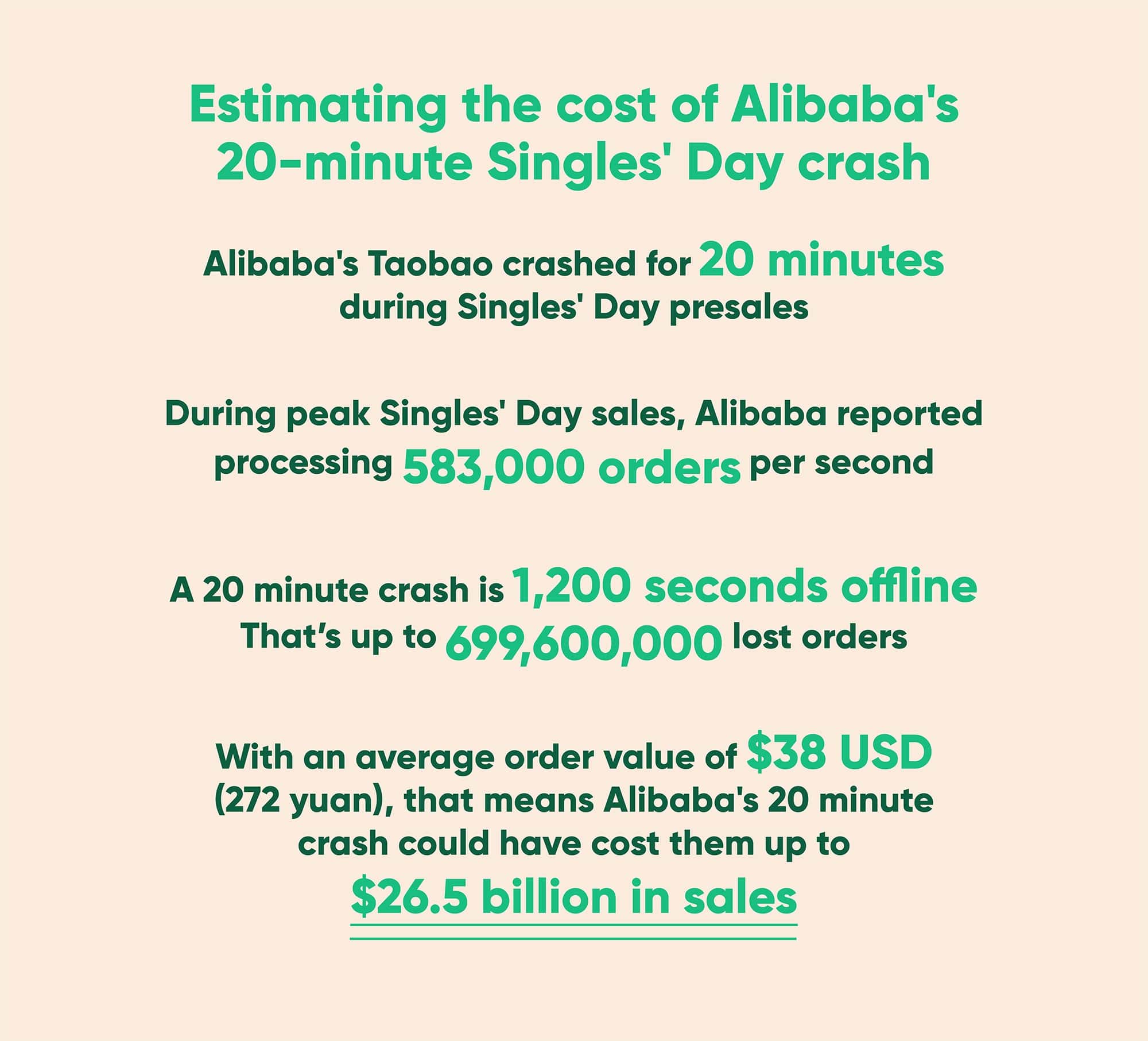
This isn’t the first year Singles’ Day has crashed sites. In 2018 the ecommerce website Momo also saw traffic reach a new high with over 700 million transactions. At one point, the website crashed for 20 minutes because of traffic overload.
On the year’s biggest ecommerce shopping day, even a minute of website downtime can result in staggering sales losses. Even minimal slowdown or downtime can have a lasting effect on brand reputation.
With billions on the line, are you doing what it takes to safeguard your website?